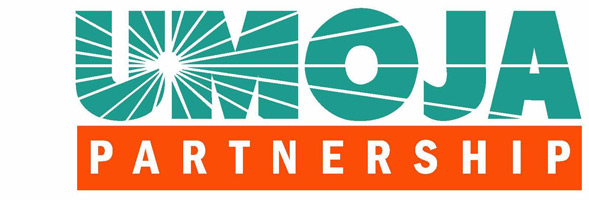Ellen Daniels-Howell, Executive Director of Global Interfaith Partnership
Over the weekend, my assignment was to visit 5 different congregations and an interfaith prayer service, bringing greetings from Indiana and sharing a bit about the Umoja Project. Much of the time I was accompanied by a group of five young adults, 18-22 years of age, who are part of the assortment of people who gather at Margaret’s house. Maurine, Perez, Criss, Timothy and Meshak all finished secondary school, but none has been able to find steady employment or raise the money necessary to continue their education. Unfortunately, they are only a minute fraction of the young Kenyans with this problem. Except for the very top students who are given government scholarships to go to the university, the post-secondary prospects are dim for a student who lives in poverty.
I’m not sure what prompted the five of them to move from one worship service to another with me. In part, hanging out with the white American simply may have been the best distraction the day offered. However, I have the feeling that these young people also were drawn to hear more about a project which draws in people from many different congregations, schools and other organizations. Although they might not articulate it this way, I think my five young friends recognize that the complex problems they face will not be solved by people working in isolation.
We had lots of time to talk as we moved from place to place. Meshak told me his father died when he was an infant and his mother struggled to raise the six children on her own. Then, when Meshak was a sophomore (Form II) in secondary school, his mother died. Meshak has lived independently ever since, as his older siblings have moved away to get married or find employment. Only one uncle remains, but he is ill.
When I asked Meshak what kind of work he would like to do most, the others laughed and told me that Meshak wanted to be a politician. Indeed Meshak does have a passion for working in government, with a vision for a parliament that truly responds to the needs of the people. His chief concern is for people like himself, who, without any good prospects for the future, turn to drugs, alcohol and crime. He knows too well all the ways a person can be tempted to escape circumstances that seem futile.
Meshak believes his dream of being a politician is completely out of reach; instead, it is more realistic for him to get a certificate in social work and counseling. He estimates he needs about $1000 for the courses and exams; so far he has saved $65. Without outside help, it will take unusual perseverance for him to be able to hang on to his goal for as long as it will take to raise the remaining money.
As the number of Umoja graduates increases, we are challenged to wrestle with problems like Meshak’s. Later in the week I will meet with our 6 Umoja graduates to learn from them first-hand about the challenges they now face. As one person put it to me so bluntly, we have made an investment in our secondary school students and, unless we address post-secondary needs, we risk not getting much return on that investment.
